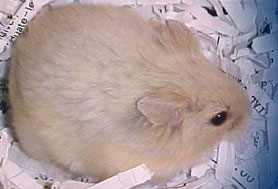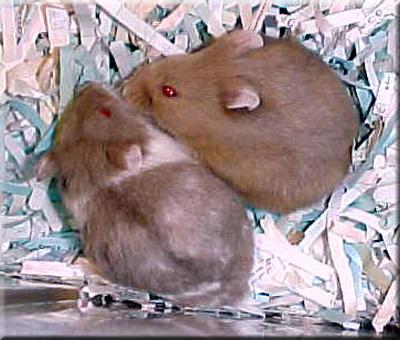

Dwarf Hamster Care
Basic Care:
| Housing | Bedding | Nesting Material | Cleaning | Exercise | Teeth | Food | Costs | Handling |
Advanced Care: Housing a breeding pair
|Things to consider | Gender | Pairing | Housing | Baby Care | Campbells Dwarf Hamster Genetics
Tip: Introduce a male and female you hope to pair in neutral territory with hiding places. Males and females will usually get along within a few days if introduced like this. Choose a large container so both male and female have room to run if one is more aggressive than the other. |
|
Housing a Pair of HamstersHousing a pair of hamsters is not much different than housing regular single or same sex pair dwarfs. It is however better to have a larger cage so that large families have room and because the cage cannot be changed for 10 days after birth. This makes for one messy cage so if it is larger the hamster waste gets spread around and is less concentrated. Some dwarfs will be neat enough to pee in one spot. If your hamster is like this you can just pick up the bedding in this spot and replace it without changing the entire cage. One warning, do not keep a pair of dwarfs that are male and female in a wire barred cage. Why you ask? Because when their babies are exactly two weeks old, they will walk out of that cage and you will have one heck of a time finding them in your house! You could place a wire cage in a plastic tub but the babies might not be able to get back to mama if the tray is too high. It is much better to keep pairs in aquariums or plastic bins for this reason. As a warning, realize that once your female is pregnant, both male and female may become nippier than normal. Some will bite hard. This is not personal. Hamsters like most animals want to protect their families. Even if they were super tame before, they may be less than appreciative if your hand goes near their nest. Most adult hamsters will revert back to their nicer dispositions once the babies are older or gone completely. Each hamster is individual so realize that their temperament may change permanently. You will however have sweet babies as pets if you socialize them around 3 weeks. If your parents are nice hamsters you can handle the babies gently for very short periods at 10 days of age. All pictures on this site are copyrighted by Odds and Endlers. Any unauthorized use is strictly prohibited. |
|
